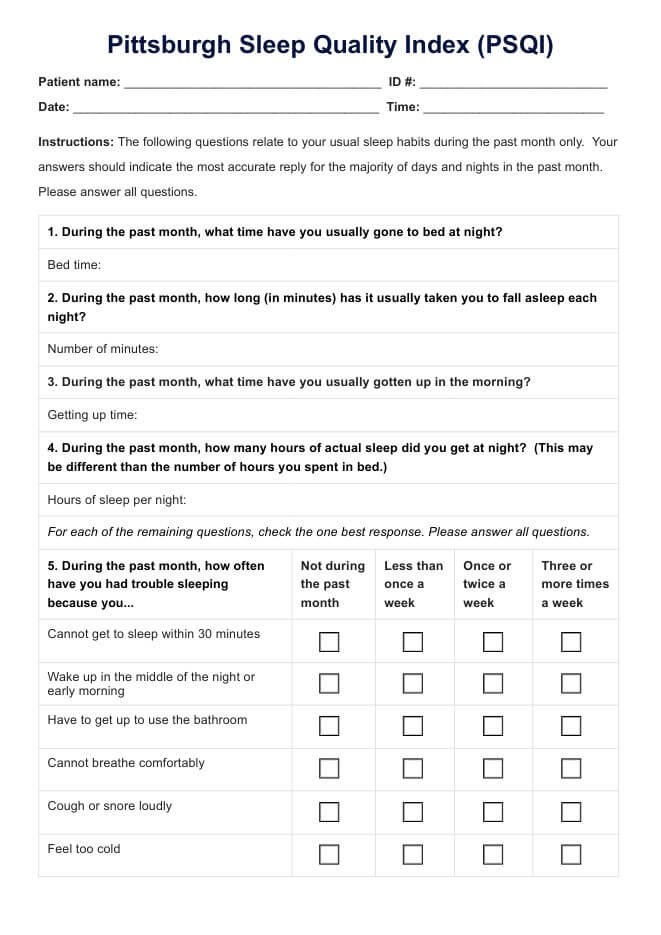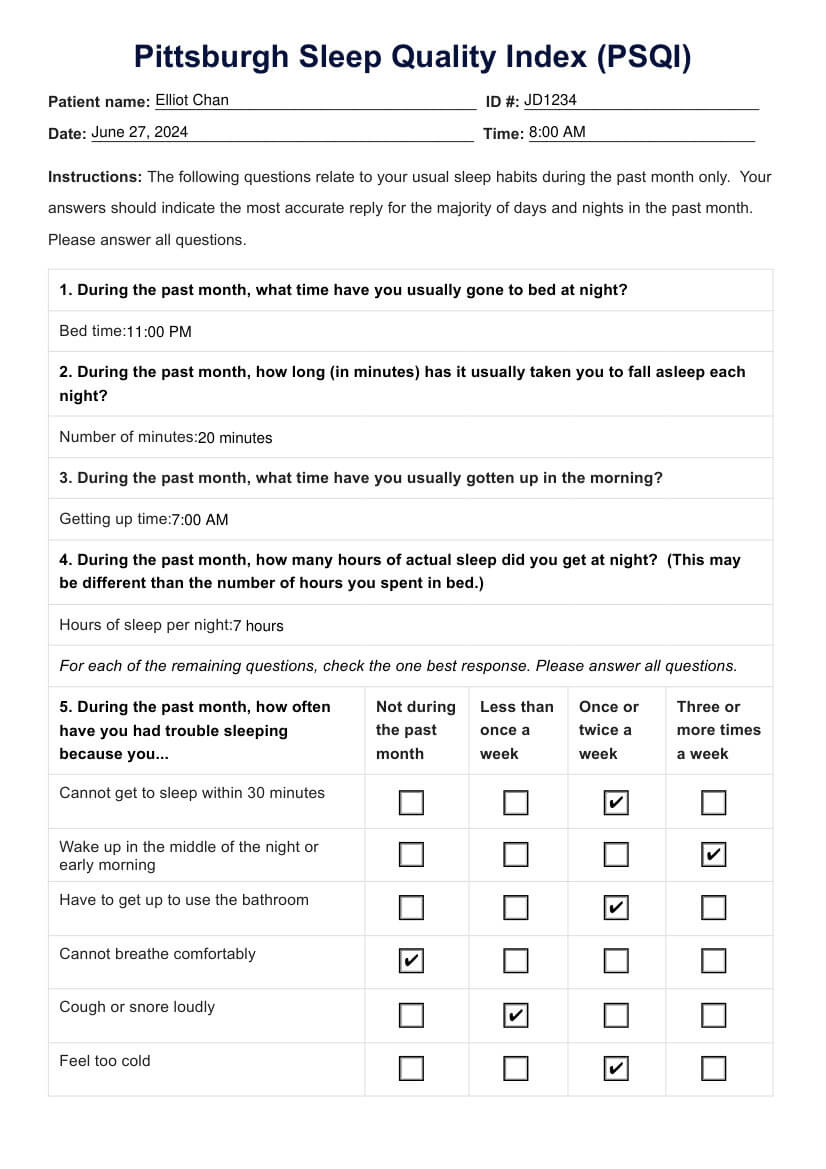Pittsburgh Sleep Quality Index (PSQI)
The Pittsburgh Sleep Quality Index (PSQI) is a widely used tool for assessing sleep quality. Learn more about PSQI and download Carepatron's free example PDF for reference.


What does it mean to have good sleep quality?
Having good sleep quality encompasses various factors that collectively contribute to overall well-being. It goes beyond simply achieving sufficient sleep duration; it involves experiencing restorative and uninterrupted sleep.
For individuals, good sleep quality means feeling refreshed upon waking, being able to maintain alertness throughout the day without excessive fatigue, and not relying heavily on sleep aids. In clinical and psychiatric practice, evaluating overall sleep quality is crucial as poor sleep is often linked to various health issues including sleep disorders and psychiatric conditions. Therefore, understanding and monitoring these parameters using tools are essential for promoting better sleep hygiene and overall health.
Characteristics of good sleep quality
Achieving good sleep quality involves several key characteristics that collectively contribute to overall well-being. These characteristics, as evaluated by tools include:
- Subjective sleep quality: Feeling rested and satisfied with your sleep upon waking.
- Sleep latency: Falling asleep within a reasonable amount of time after getting into bed.
- Sleep duration: Obtaining sufficient sleep for your age group, typically 7-9 hours for adults.
- Habitual sleep efficiency: Spending at least 85-90% of your time in bed asleep rather than awake.
- Sleep disturbances: Experiencing minimal disruptions during the night, such as waking up frequently.
- Daytime dysfunction: Avoiding excessive daytime sleepiness or fatigue that impairs daily functioning.
- Use of sleeping medication: Not relying heavily on medications to induce or maintain sleep.
These characteristics are crucial in assessing sleep quality both in clinical settings, such as psychiatric practice, and for individuals seeking to improve their overall health and well-being. Understanding and monitoring these factors can help identify and address potential sleep disorders and promote better sleep hygiene.
Factors that negatively impact sleep quality
Several factors can significantly affect sleep quality, leading to disrupted or poor-quality sleep. Identifying these factors is crucial for improving overall well-being and addressing sleep-related issues effectively. Common factors include:
- Sleep disorders: Conditions such as insomnia, sleep apnea, restless legs syndrome, and narcolepsy can severely disrupt sleep patterns.
- Poor sleep hygiene: Practices such as irregular sleep schedules, excessive screen time before bed, and consuming stimulants like caffeine or nicotine close to bedtime.
- Environmental factors: Noisy or brightly lit sleep environments, uncomfortable mattresses or pillows, and extreme temperatures can interfere with sleep.
- Stress and anxiety: Mental health issues, work-related stress, or personal concerns can lead to difficulty falling asleep or staying asleep.
- Medical conditions: Chronic pain, asthma, allergies, and other medical conditions can cause discomfort that disrupts sleep.
- Medications: Certain medications, including antidepressants, antihistamines, and medications for high blood pressure, can affect sleep quality.
- Lifestyle choices: Lack of physical activity, poor diet, and excessive alcohol consumption close to bedtime can all impact sleep negatively.
Addressing these factors through lifestyle changes, improved sleep hygiene, and sometimes medical intervention can help improve sleep quality and overall health.
Pittsburgh Sleep Quality Index (PSQI) Template
Pittsburgh Sleep Quality Index (PSQI) Sample
What is the Pittsburgh Sleep Quality Index (PSQI)?
The Pittsburgh Sleep Quality Index (PSQI) is a widely used tool designed that assesses sleep quality for poor sleepers and patterns over a one-month period. The tool can measure sleep quality with several components of sleep to provide a comprehensive overview of an individual's sleep quality. These components include subjective sleep quality, sleep latency (the time taken to fall asleep), sleep duration, habitual sleep efficiency (the percentage of time spent asleep while in bed), sleep disturbances (such as waking up during the night), use of sleeping medication, and daytime dysfunction caused by poor sleep.
The PSQI consists of 19 self-rated questions and five questions rated by a roommate or bed partner, if available. The questionnaire generates a global score ranging from 0 to 21, where higher scores indicate poorer sleep quality. This score helps healthcare practitioners and researchers quantify and understand an individual's overall sleep quality and identify potential sleep disorders or disturbances.
The PSQI is valuable in both clinical and research settings, providing a standardized method to assess sleep quality across different populations and monitor changes over time. Its structured approach aids in diagnosing sleep-related issues and developing targeted interventions to improve sleep hygiene and overall well-being.
How to use our Pittsburgh Sleep Quality Index template
The Carepatron Pittsburgh Sleep Quality Index template offers a structured approach for medical professionals to assess sleep disorder patients. This tool is invaluable in clinical sleep medicine and psychiatric clinical practice for evaluating sleep patterns and identifying potential sleep disorders. Here’s how to effectively utilize the PSQI template:
Step 1. Introduce the PSQI template
Begin by introducing the PSQI template to the patient. Explain the purpose of assessing sleep quality and how the questionnaire will help in understanding their sleep patterns.
Step 2. Administer the PSQI
Guide the patient through each section of the PSQI template. Ensure they understand each question related to subjective sleep quality, sleep latency, sleep duration, habitual sleep efficiency, sleep disturbances, use of sleeping medication, and daytime dysfunction.
Step 3. Score the PSQI
After the patient completes the questionnaire, score each component based on their responses. Sum these scores to calculate the global PSQI score, which ranges from 0 to 21.
Step 4. Interpreting the results
Evaluate the global PSQI score: scores above 5 indicate poor sleep quality, suggesting further evaluation or intervention may be necessary. Discuss the implications of the results with the patient and outline potential next steps for improving sleep hygiene or seeking specialized care if needed.
Using Carepatron’s PSQI template facilitates a standardized and systematic approach to assessing sleep quality, aiding in comprehensive patient care and management of sleep-related issues.
Commonly asked questions
A good sleep quality index score on the Pittsburgh Sleep Quality Index (PSQI) is typically considered to be 5 or less. Scores above 5 indicate poorer sleep quality and may suggest the presence of sleep disturbances.
Yes, the Pittsburgh Sleep Quality Index is a validated and widely used tool in sleep research and clinical practice. It has been validated against objective measures of sleep and shown to reliably assess sleep quality across various populations.
The Pittsburgh Sleep Quality Index comprises seven components: subjective sleep quality assesses overall satisfaction with sleep, sleep latency measures how quickly one falls asleep, and sleep duration evaluates total hours slept. Habitual sleep efficiency quantifies the percentage of time spent asleep while in bed, sleep disturbances record frequency of waking up during the night, use of sleeping medication tracks reliance on sleep aids, and daytime dysfunction evaluates impact on daily functioning due to poor sleep quality.
The theory behind the Pittsburgh Sleep Quality Index is to comprehensively evaluate an individual's sleep quality over a one-month period. It assesses multiple dimensions of sleep to provide a global score that indicates overall sleep quality and identifies potential sleep disorders or disturbances.























-template.jpg)
















































































